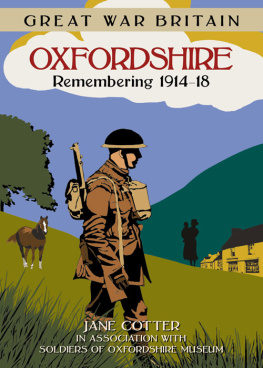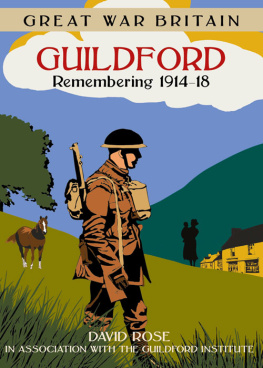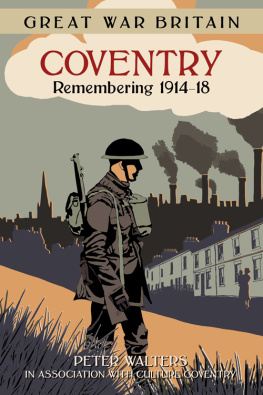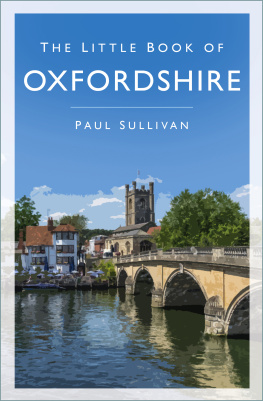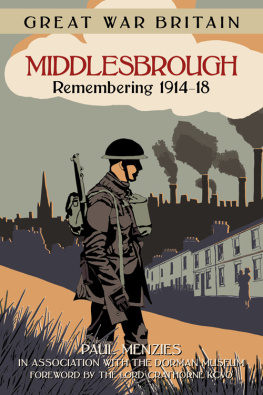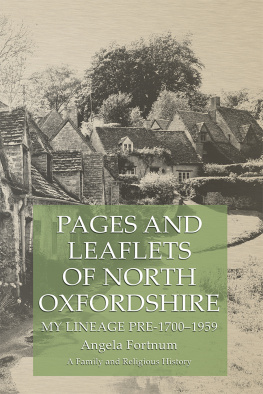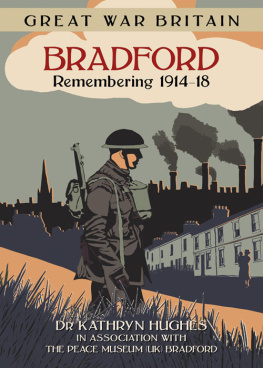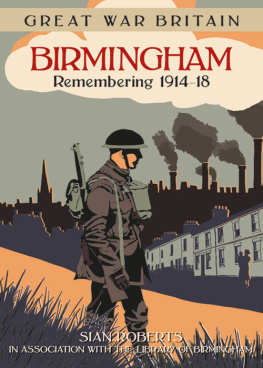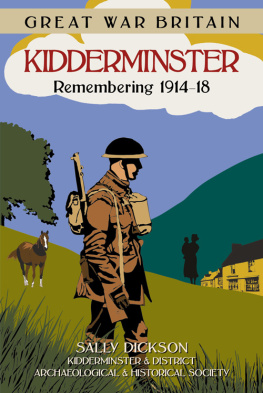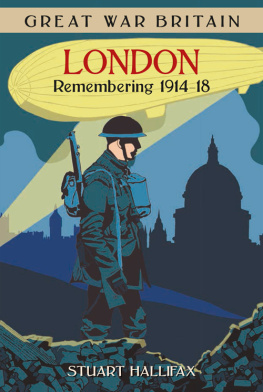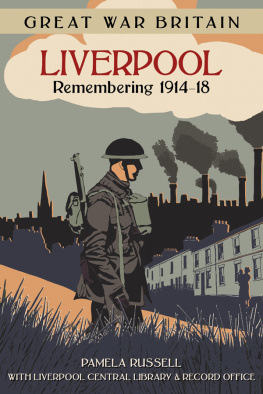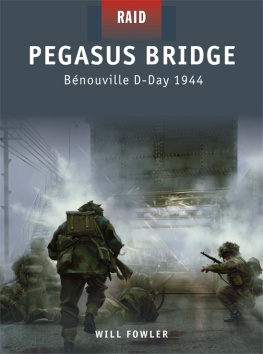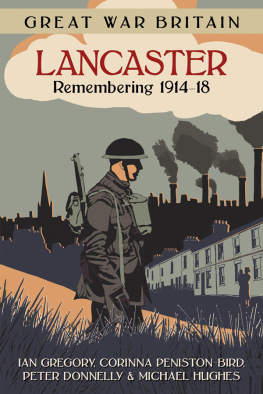
This book is dedicated to the residents and
soldiers of Oxfordshire 19141918.
C ONTENTS



My grandfather was just 8 years old when his father died in France in 1917, just twelve months after he had lost his eldest brother on the Western Front. His experience echoing that of so many in the country and county.
As a child, I would frequently ask him to tell me a story about the olden days, and he would happily recount tales of his childhood growing up in The Rookery on the edge of Port Meadow in Wolvercote. Though his early years were blighted by the loss of war, his stories and memories always focused on the practicalities of life, often amusing and always told with affection. Many of these stories illustrated the resilience and fortitude of life for an ordinary Oxfordshire family during the First World War. It was thanks to these recollections that my interest in this period of history was ignited.
I am very grateful to many people for their help and guidance over the course of researching and writing this book, particularly all involved with the Soldiers of Oxfordshire including Jim Pearson and Mike Cross for their patience in answering my endless questions and Brigadier David Innes for taking the time to read and comment on the final draft of the book.
All those who have kindly provided images have been credited where appropriate. Any uncredited images, meanwhile, are from my collection.
Very special thanks go to my mum as always and my friends who stepped up for childcare duties as I shut myself away to work. The time taken by my husband Michael and my friend Lorraine Yardley to read, comment, question and correct chapters as I wrote them was greatly appreciated. Thanks are also due to Stephen Barker for sharing his knowledge and expertise and guiding me throughout the process.
Last, but by no means least, I am extremely grateful to my children Noah and Toby for their tolerance and patience as I wrote. Their endless questions about the status of the book proved as much of a driving force to complete it as the publishers deadline. I would like to think that they have learned a little of their history along the way.
Jane Cotter, April 2014
A local journalist writing for the Witney Gazette in the days directly after the declaration of war pondered, I wonder what an historian in a centurys time will have to say respecting the events of the last few days. For all that has happened over the last 100 years, it is testament to the many who made sacrifices that it is not just historians and academics who now reflect on the actions and events of the Great War.
As we now consider the events in the years during and directly after the war, and try to understand the experiences of those who lived, fought and died, we are left with little doubt that what was to become the First World War would have been beyond comprehension to those reading the news of war in August 1914.
The enduring images of the First World War the battlefields of France and the poppies of peace make it easy to forget that the Great War extended far beyond that; not just within the confines of geography. The lives of those on the home front were changed forever as the war brought about huge social, political and economic change.
With stories and anecdotes from First World War soldiers and civilians alike now firmly in our recorded history, we should be grateful to those who, over the years, have taken time to record and preserve these memories from which we can now draw information to illustrate and explain the experiences of the people of Oxfordshire during the First World War. The county regiments the Oxfordshire and Buckinghamshire Light Infantry and the Oxfordshire Yeomanry and every town and village had its own experiences and its own story to tell. Together they paint a picture of the impact that war had on all lives, social and military, in Oxfordshire.
Geographically, Oxfordshire on the brink of war in 1914 was not much different to the county as it is today. Prior to boundary changes of 1974, the Vale of the White Horse district and parts of South Oxfordshire were in Berkshire, and conversely, the areas of Caversham (now Berkshire) and Stokenchurch (now Buckinghamshire) were in Oxfordshire. This book focuses on Oxfordshire as it was in 1914. At its centre is the historic university city of Oxford, surrounded by a mix of suburbs, farmland, market towns, rural villages and pockets of industrialisation.
As with the rest of the nation in the days leading up to to war, the county was still incredulous about the prospect of conflict with Germany. In London, the prime minister, Herbert H. Asquith (19081916), had already acknowledged that there was only one possible outcome to the actions and aggressions that had divided Europe. He wrote:
August 2 1914. Things are pretty black. Germany is now in active war with both Russia and France and the Germans have violated the neutrality of Luxembourg. We are waiting to know whether they are going to do the same with Belgium Happily I am quite clear in my own mind as to what is right and what is wrong.
To the general Oxfordshire population, the historical nineteenth-century alliance of Germany, Austria-Hungary and Italy and the 1907 alliance of France, Russia and the United Kingdom of Great Britain & Ireland would have meant little. The growing hostilities between nations were reported by the local press as events without bearing on the county. Where murmurs of discontent did appear, little was done to translate the complexities of the political situation into the possible impact on the general population.
Following the assassination of the Austrian Archduke Franz Ferdinand in Sarajevo on 28 June 1914, a stark ultimatum was sent by Austria to Serbia, whose expansion and nationalism had led some of its citizens to make a series of assassination attempts on various Austro-Hungarian figures. It was never intended to be accepted and war soon broke out in the Balkans. Russia an ally of Serbia began to mobilise its army. What followed had a domino effect on old alliances, promises and treaties. Germany allied to Austria delivered ultimatums to both Russia and France and, at the beginning of August, a vast German army attacked France through neutral Belgium. Britain, obligated by the 1839 Treaty of London to secure Belgiums neutrality in the event of an invasion, issued an ultimatum to Germany to retreat from Belgium by midnight on 3 August 1914. The response from Germany was unsatisfactory and the Foreign Office released the following statement:
Owing to the summary rejection by the German Government of the request made by His Majestys Government for assurances that the neutrality of Belgium would be respected, His Majestys Ambassador in Berlin has received his passport, and His Majestys Government has declared to the German Government that a state of war exists between Great Britain and Germany as from 11 p.m. on August 4th.
Oxfordshire was at war.
Public Reaction to War
Such was peoples anxiety surrounding the prospect of war, that on Sunday, 2 August 1914, crowds gathered at Henley railway station in anticipation of the special editions of The Times and the Daily Mail rumoured to be arriving from the capital. The crowds were so large that rails were placed across the entrances and only travellers were permitted into the station. Each train was met with disappointment as the message was repeated: No papers. All snapped up in London.
Next page
